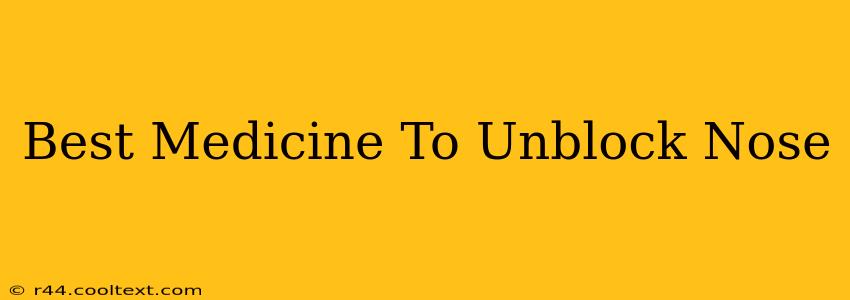A stuffy nose can be incredibly frustrating, making it hard to breathe, sleep, and even enjoy your favorite foods. Luckily, there are several effective medicines and home remedies to unblock your nose and provide fast relief. This guide will explore the best options, helping you choose the right medicine for your specific needs and situation. Remember to always consult your doctor or pharmacist before starting any new medication, especially if you have underlying health conditions.
Understanding Nasal Congestion
Before we dive into the best medicines, let's understand what causes a blocked nose. Nasal congestion is usually caused by inflammation and swelling of the mucous membranes lining your nasal passages. This can be triggered by:
- The common cold: Viral infections are a frequent culprit, leading to inflammation and increased mucus production.
- Allergies: Pollen, dust mites, pet dander, and other allergens can trigger an allergic reaction, causing your nose to become congested.
- Sinusitis: An infection or inflammation of the sinuses can also lead to nasal congestion and other symptoms like facial pain and pressure.
- Flu: Influenza can cause significant nasal congestion, along with other flu-like symptoms.
Best Medicines to Unblock Your Nose
The best medicine for a blocked nose depends on the underlying cause and your individual needs. Here are some popular and effective options:
1. Saline Nasal Sprays and Rinses: A Gentle Approach
Saline nasal sprays and rinses are excellent for gently clearing nasal passages. They work by flushing out mucus and irritants, providing immediate relief from congestion. These are generally safe for most people, including children and pregnant women. Look for saline solutions that are isotonic, meaning they have the same salt concentration as your body fluids.
2. Decongestant Nasal Sprays: For Quick Relief (Use Cautiously)
Decongestant nasal sprays, containing phenylephrine or oxymetazoline, constrict blood vessels in the nasal passages, reducing swelling and providing quick relief. However, it's crucial to use these sparingly, as prolonged use can lead to rebound congestion – making your congestion worse in the long run. Limit use to 3-5 days.
3. Oral Decongestants: A Systemic Approach
Oral decongestants, such as pseudoephedrine or phenylephrine, work similarly to nasal sprays but are taken by mouth. They provide relief throughout the body, not just in the nose. Be aware that these can raise blood pressure, so they may not be suitable for people with hypertension or other heart conditions.
4. Antihistamines: For Allergy-Related Congestion
If your nasal congestion is caused by allergies, antihistamines can be very helpful. These medications block histamine, a chemical released during an allergic reaction that contributes to nasal congestion, sneezing, and itching. They are available in both oral and nasal spray forms.
5. Over-the-Counter (OTC) Medications: Combining Relief
Many OTC medications combine different active ingredients, providing relief from multiple symptoms. For example, some formulations combine a decongestant with an analgesic (pain reliever) and/or an antihistamine. Always read the label carefully and choose a product that addresses your specific symptoms.
Home Remedies for Nasal Congestion
In addition to medications, several home remedies can help relieve nasal congestion:
- Drink plenty of fluids: This helps thin mucus, making it easier to clear.
- Use a humidifier: Adding moisture to the air can ease congestion.
- Apply a warm compress to your forehead and sinuses: This can help soothe inflammation and pain.
- Elevate your head: Sleeping with your head elevated can help drain mucus and improve breathing.
- Gargle with warm salt water: This can help soothe a sore throat and potentially reduce congestion.
When to See a Doctor
While many cases of nasal congestion can be treated effectively at home, it's essential to see a doctor if:
- Your symptoms last for more than 10 days.
- Your congestion is severe or accompanied by other symptoms like fever, headache, or facial pain.
- You have difficulty breathing.
- You experience recurrent nasal congestion.
By understanding the causes and available treatments, you can effectively manage nasal congestion and breathe easy again. Remember to always consult a healthcare professional for personalized advice and treatment.

